On November 8, Senator Lisa Murkowski introduced legislation that takes the Arctic National Wildlife Refuge one step closer to oil extraction. If passed, the bill would allow 2,000 acres of the 1002 zone to be opened to development for “wells and support facilities,” the Huffington Post reports. The committee hearing for the bill will take place on Wednesday, November 15. —The Editors
—
On October 19, the U.S. Senate rejected a budget amendment that would have blocked a key panel from raising revenue via drilling in Alaska’s Arctic National Wildlife Refuge. This area covers 19.64 million acres of land in Northern Alaska. It’s the largest designated wilderness zone within the National Wildlife Refuge System, but on the outskirts of the protected area overlooking the Beaufort Sea, is a contested swath of land designated the 1002 zone. This zone came into being in 1980, when congress enacted the Alaska National Interest Lands Conservation Act, stipulating that 1.5 million acres on the reserve’s coastal plain would be inventoried for its fish, wildlife and natural resource prospects. 1002 refers to the section in the act outlining these exceptions within the greater wilderness designation.
The recent Senate decision could open doors for oil prospecting companies looking to gain a permanent foothold in the refuge. To learn more about the region, its ecology and the ongoing battle for the preservation of Alaska’s wilderness, we talked with ski-mountaineer and adventurer Kit DesLauriers to hear about her thoughts on past travels and scientific expeditions to the refuge and how she has interpreted the news of the October 19 Senate decision. Here’s what she had to say.
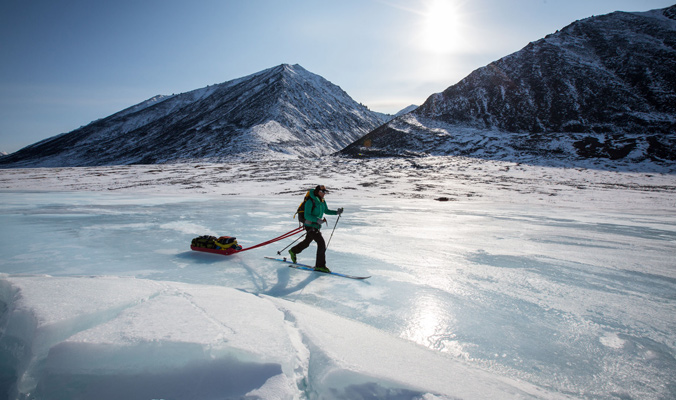
Frozen rivers often make for fast skiing in the Arctic National Wildlife Refuge. [Photo] Andy Bardon
In 1996, the Republican-majority House and Senate voted to allow drilling in the refuge, but this legislation was vetoed by President Bill Clinton. Now, President Trump is spearheading oil drilling in the Arctic Refuge with his backdoor style budget inclusion as a way to offset his proposed tax cuts. The only hope now is the budget doesn’t pass.
The Arctic National Wildlife Refuge represents to me the most intact, wild, remote and biologically diverse landscape that we have in this country, and it’s also very, very large; it’s the size of South Carolina with no roads and no trails. And it’s meaningful to me to be able to go to a place so massive that I can move through it for days and weeks on end in the ways I imagine we humans used to move through the lower 48 once upon a time. It’s really important to me to know that there’s still a place like that there, and to know that I can go there to reset—although not without hardship—it’s expensive, inhospitable and hard to get to. But I like to go to these wild places. I think it’s also important that we don’t alter all these diverse and poignant landscapes, and that we protect them from the impact of development.
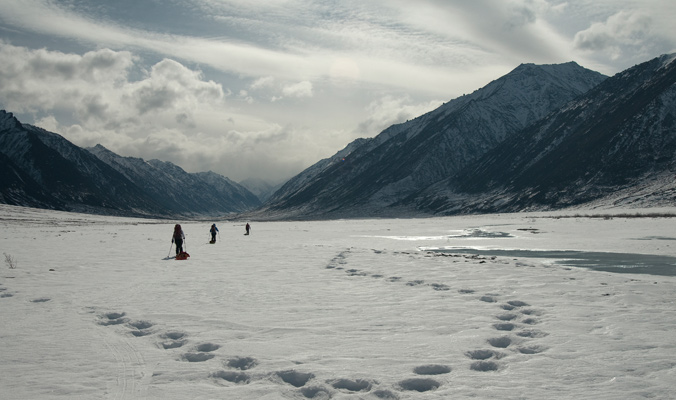
Polar bear tracks wind across the ice. [Photo] Chris Figenshau
And of course the area they are trying to open to drilling is not technically designated as Wilderness—it’s in this 1002 zone. In the Arctic Refuge, drawing a boundary is ridiculous. We crossed all these tracks of animals that would never understand that delineation, yet they would be very affected by it. We walked by a polar bear den in the foothills of the mountains, and I learned later from a biologist that it’s one of the only places in the world where polar bears den in the mountains, because its so close to the sea. This habitat for animals, like the polar bear and caribou, is critically intertwined with the 1002 zone.
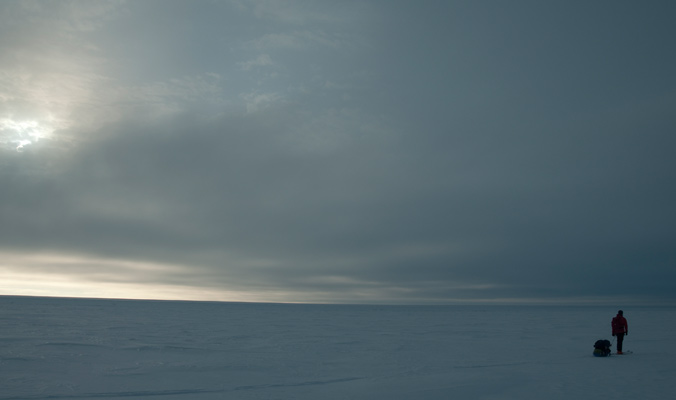
DesLauriers crosses the 1002 zone. [Photo] Chris Figenshau
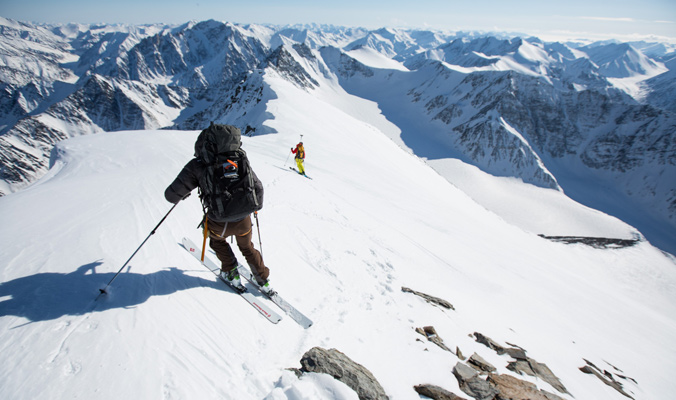
Don Carpenter follows DesLauriers off the summit of Mt. Isto, the highest point in the Arctic National Wildlife Refuge. [Photo] Andy Bardon







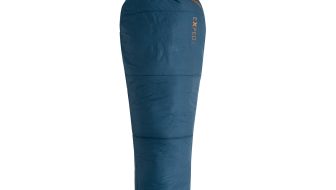
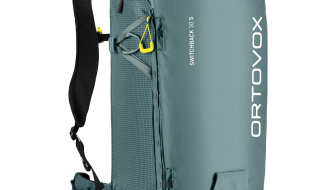

Thanks Kit, for speaking up about this issue. Fossil Fuels need to stay in the ground. We all know we are living in a time when the Republicans bottom line is money. Air and water quality water and wilderness are of no use to them. Everyone needs to speak up and tell their politicians how they feel about this. Am I the only Backcountry Magazine reader with an opinion on this subject. Where will we all ski after the Republicans rape America for its natural resources
I am just wondering, if Kit used fossil fuels to reach her Arctic National Wildlife Refuge? Also what is the alternative? Get oil from the Middle East?
Cynthia, your weak casuistry is noted. Measured CO2 levels (Vostok Ice Cores) is now higher than at any time in the last 800,000 years and rising. Not only doesn’t the U.S., currently the number one exporter of fossil fuels, need more oil or gas fields, but these hydrocarbon products need to remain sequestered underground to mitigate extinction level warming. All efforts should be aimed at renewable energy technology, not outdated, inefficient and deleterious carbon solutions.
Wonder no longer… of course she did. So whats your point? If this is the response to every issue we face then we all risk being labeled a hypocrite. One can believe that the cost of drilling in the Arctic National Wildlife Refuge is not worth the benefit and still drive a fossil fueled car.
I believe the legislation will allow development on 2000 out of the roughly 19 million acres of anwr; none of it wilderness. That’s about 1/10,000th of the site. Hard to imagine it will have much impact or be noticeable as long as the industry is held accountable to meet its kegal responsibilities.
Having spent many weeks in the Arctic National Wildlife Refuge, like Kit I have been fortunate in having experienced a land without boundaries except rivers, mountains and the ocean’s shore. Only wildlife animate the landscape, only the sound of wind and water interrupt the silence. The terrain rises, folds and bends without the straight lines of man, and the few footprints left by generations recent and long past disappear with each year’s ice and thaw. However, the tracks of trucks still scar the fragile tundra a half century after their passage, and the consequences of industrial development lie just over the western horizon like a tide waiting to rush in and wash away the unbroken land. Two-faced politicians will promise and betray, faceless corporations will drill and profit, and the silence will be lost.
I wonder if all those who were absent from the polling both last year , have any regrets at all with there choices now . The Keystone pipeline has already had a leak, and it will be just a matter of time before another spill ends up in a river. Weather conditions on the keystone are mild compared to ANWR, how could a spill ever be cleaned up ? The fact is, it wouldn’t be cleaned up and a fragile environment destroyed for generations.
You have to ask why, with oil prices down because the inventories are maxed out, a glut of crude that has caused national catastrophe in South America !
Living in Colorado, every month I see another well being drilled, and wonder when the earthquakes will start, ala Oklahoma.
Now that the American Oligarchs have control of all the branches of government, at least for one more year, they will push to rape as much from the earth as they can !